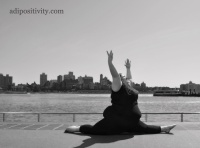 I got an e-mail response to yesterday’s blog from a woman who asked “can you address the practical side of it? How do you deal with the sweaty, rubbing aspect of bodies, especially in the heat”
I got an e-mail response to yesterday’s blog from a woman who asked “can you address the practical side of it? How do you deal with the sweaty, rubbing aspect of bodies, especially in the heat”
This is a big deal because we live in a society that tells us that our bodies, if they are fat, are not worthy of care. We also get the message that the needs of a fat body are embarrassing and shameful. We are in charge of whether or not we believe these things, and I do not. I think my body is amazing and worthy of great care.
My first experience with this was when I decided to look for a solution to inner thigh chaffing (aka “chub rub”). What shocked me most was that it wasn’t just fat women – there were thin women dealing with the same issues. That’s when I realized that these aren’t just “fat people issues” it’s just that fat people are the only ones encouraged to be ashamed of them.
For me, it’s all about honoring the needs of my body without guilt or shame. Here are some examples:
Chaffing
There are all kinds of cremes and powders to address this. There’s a thread about those here [TW – not a Health at Every Size Space]. Making sure that your clothes fit well is another part of it. When I’m wearing skirts I often wear leggings under them (long length if I want them to show and bike short length if I don’t want them to show). This also helps with the fact that I have a hard time remembering to sit like a lady and I have a tendency to just high kick for any old reason! There are also cloth pads that you can buy that go under your bra or in your tunny fold to prevent chaffing. I bought the bra ones because sometimes I dance in an underwire bra and that makes the skin under my breasts really sad. The pads cleared the problem right up.
Showering
It’s possible that a combination of body size and/or arm length and/or inflexibility will lead to you know being able to reach your whole body when showering. Consider using loofah or other sponges that have long handles, getting a shower head that separates. While you’re at it, consider investing in a big, ginormous towel or two (I have found that it’s completely awesome to have a towel that matches my bodies proportions) and make sure that you dry off thoroughly.
Treats!
Your body is awesome and it can feel awesome to treat it well with special things and decorations. It can be as simple as a scented lotion or a bubble bath, or as dramatic as a tattoo or piercing.
More of Me to Love, Ample Stuff, and My Size USA all offer products specifically to help people take care of their large bodies. (I don’t get paid by any of these sites, More of Me to Love was the major donor on the Billboard Project).
Regardless, if I let people shame me into not taking good care of my big amazing body then the shamers win and I’m the only one who suffers.
So, today is “ask me anything about self-care day”! Leave a comment with your question, and I’ll do my best to get you an answer.
I also wrote this week for iVillage about the Vogue article involving the mother who decided to make body shame part of her 7 year old daughter’s inheritance. Feel free to read and comment if the mood strikes you!
This blog is supported by its readers rather than corporate ads. If you feel that you get value out of the blog, can afford it, and want to support my work and activism, please consider a paid subscription or a one-time contribution. The regular e-mail subscription (available at the top right hand side of this page) is still completely free. Thanks for reading! ~Ragen









